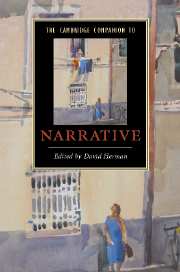7 - Focalization
from Part II - Studying narrative fiction: a starter-kit
Published online by Cambridge University Press: 28 September 2007
Summary
If narratology - the structural theory and analysis of narrative texts - were to be divided into just two major parts, then narration and focalization would be very suitable candidates. Narration is the telling of a story in a way that simultaneously respects the needs and enlists the co-operation of its audience; focalization is the submission of (potentially limitless) narrative information to a perspectival filter. Contrary to the standard courtroom injunction to tell “the whole truth,” no-one can in fact tell all. Practical reasons require speakers and writers to restrict information to the “right amount” - not too little, not too much, and if possible only what's relevant.
In its original conception, dating back to the late 1960s, narratology is a timeless and culture-independent discipline. Yet narratologists have increasingly become aware of the fact that their seemingly neutral theoretical models may have been shaped by cultural and historical contingencies. This is definitely so in the case of focalization because our present notions about perspectival filtering would hardly exist without the psychological interest that informs Western narrative literature from roughly the eighteenth century novel onwards. The psychological turn reaches its height with the institution of psychology as a discipline and the flowering of the Modernist literary movement in the period of 1900 to 1950. Let us try to unravel this historical background by taking a brief look at the narrative aesthetics of the Modernist era.
- Type
- Chapter
- Information
- The Cambridge Companion to Narrative , pp. 94 - 108Publisher: Cambridge University PressPrint publication year: 2007
- 30
- Cited by

